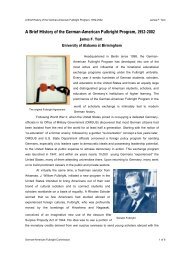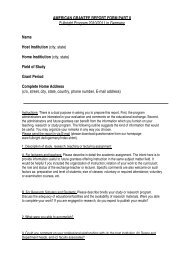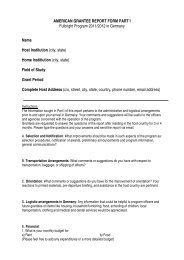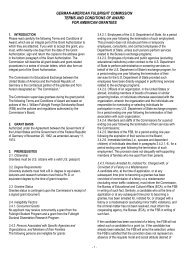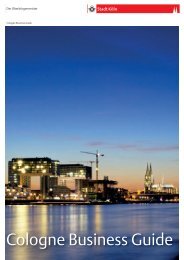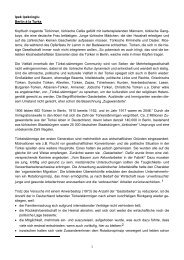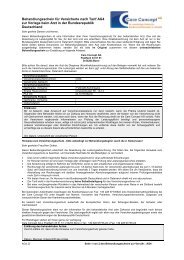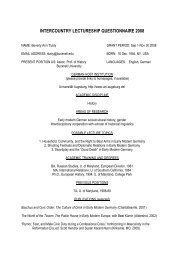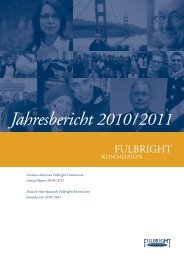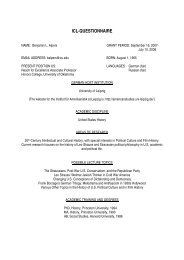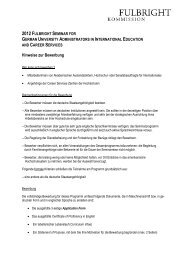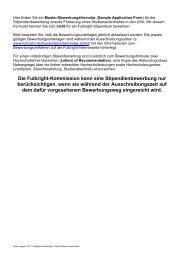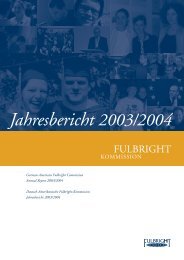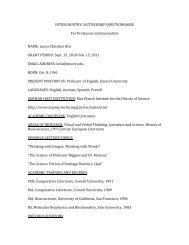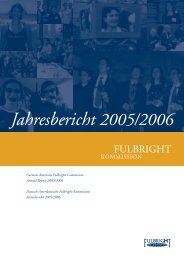Funnel 40/2, Inhalt - Fulbright-Kommission
Funnel 40/2, Inhalt - Fulbright-Kommission
Funnel 40/2, Inhalt - Fulbright-Kommission
You also want an ePaper? Increase the reach of your titles
YUMPU automatically turns print PDFs into web optimized ePapers that Google loves.
Beyond the Transatlantic<br />
The word “trialogue” may be a bit odd,<br />
but on the fiftieth anniversary of the<br />
Berlin Seminar the <strong>Fulbright</strong> Commission<br />
decided to have exactly that by addressing<br />
a controversial topic that would<br />
include views from Germany, the U.S.,<br />
and the Islamic World. The topic for this<br />
three-way discourse was “The University<br />
and Islam: International Exchange and<br />
the Dialogue of Cultures.” This discussion,<br />
which was generously supported by<br />
a U.S. State Department grant, included<br />
a diverse group of participants representing<br />
American and German students, universities,<br />
media, and governments.<br />
After Dr. Rolf Hoffmann welcomed<br />
everybody and stressed the need for the<br />
integration of Europe’s Muslims and the<br />
need for dialogue amongst all three regions,<br />
Dr. Richard Schmierer, Minister Counselor<br />
for Public Affairs, U.S. Embassy<br />
Berlin, discussed education and its growing<br />
importance as a tool of reform.<br />
Ambassador Edward Djerejian, Director<br />
of the James Baker III Institute for Public<br />
Policy at Rice University, discussed the<br />
2003 State Department report, “Changing<br />
Minds, Winning Peace,” written by the<br />
United States Advisory Group on Public<br />
Diplomacy for the Arab and Muslim<br />
World.<br />
The report contained recommendations<br />
for addressing problems in the perception<br />
of the U.S. in the Islamic World<br />
such as creating a new White House director<br />
of public diplomacy, building libraries<br />
and information centers in the Muslim<br />
world, translating more Western books<br />
into Arabic, increasing scholarships and<br />
The Berlin Seminar wraps up its theme “Where Contintents Meet”<br />
with a discussion amongst the U.S., Germany, and the Islamic World<br />
by David Beffert<br />
visiting fellowships, upgrading the American<br />
Internet presence, and training more<br />
Arabists, Arab speakers, and public relations<br />
specialists to work for the State<br />
Department.<br />
One of the highlights of the day-long<br />
seminar was a group of exchange students<br />
talking about their experiences. This section<br />
featured two German Academic<br />
Exchange Service (DAAD) grantees to<br />
Germany from the Arab world and a German<br />
<strong>Fulbright</strong> alumna of Turkish heritage<br />
to the United States. They discussed reactions<br />
in their host countries to their being<br />
Muslim. They often ran into stereotypes<br />
TITLE TOPIC 19<br />
Current and former <strong>Fulbright</strong> grantees, guests from embassies in Berlin, as well as representatives from<br />
higher education join the discussion.<br />
but, surprisingly, little harassment. Both of<br />
the women, however, do not wear headscarves,<br />
which they both felt made people<br />
less antagonistic.<br />
Maha El Nady, a DAAD grantee from<br />
Egypt, and Ganime Ösme, a German <strong>Fulbright</strong><br />
grantee to the U.S., also defended<br />
women’s role in Islam and Islamic countries,<br />
saying that media coverage did not<br />
present a differentiated enough picture. It<br />
was pointed out for example, that in Egypt<br />
there are many women professors at the universities.<br />
Abdelmalik Hibaoui, a Moroccan<br />
DAAD grantee currently at the Oriental<br />
Institute at the University of Tübingen, also<br />
THE FUNNEL • VOLUME <strong>40</strong> • NUMBER 2 • SUMMER 2004



